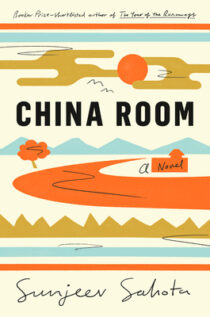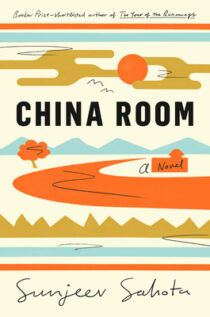
What remained was a feeling of quiet rapture, of dawn colours slowly involving themselves with the day, a champagne brightness starting to warm my skin and the waving acres of corn and wheat, the soft green hills that followed no pattern, a distant stone hut that held the horizon and a long tapered track driving on until I couldn’t even imagine that I could see it. The orange sun broke upwards and placed, and they did seem placed, great beams of light across all that waiting land. For the first time in my life I had a sense of the world turning. All these years later and I can still see myself standing there, spellbound, marveling, my breath taken. ~ Sunjeev Sahota, China Room
Mehar, a young bride in rural 1929 Punjab, is trying to discover the identity of her new husband. Married to three brothers in a single ceremony, she and her now-sisters spend their days hard at work sequestered from contact with the men—except when their domineering mother-in-law, Mai, summons them to a darkened chamber at night. Curious and strong willed, Mehar tries to piece together what Mai doesn’t want her to know. From beneath her veil, she studies the sounds of the men’s voices, the calluses on their fingers as she serves them tea. Soon she glimpses something that seems to confirm which of the brothers is her husband, and a series of events is set in motion that will put more than one life at risk. As the early stirrings of the Indian independence movement rise around her, Mehar must weigh her own desires against the reality—and danger—of her situation.
Spiraling around Mehar’s story is that of a young man who arrives at his uncle’s house in Punjab in the summer of 1999, hoping to shake an addiction that has held him in its grip for more than two years. Growing up in small-town England as the son of an immigrant shopkeeper, his experiences of racism, violence, and estrangement from the culture of his birth led him to seek a dangerous form of escape. As he rides out his withdrawal at his family’s ancestral home—an abandoned farmstead, its china room mysteriously locked and barred—he begins to knit himself back together, gathering strength for the journey home.
China Room reminded me of the lack of control women have had over their own lives throughout history and that continues to this day in many cultures. It’s hard to fathom that Mehar and her sisters-in-law didn’t even know who their husbands were. Their primary roles were to submit to their husbands and produce male heirs. This subjugation came from another woman, which was even more disturbing. The book also opened my eyes to the racism people of Indian descent experienced as recently as twenty years ago and the horror of self-detoxing from heroin without the assistance of withdrawal medication.
Some of Sahota’s writing was beautifully lyrical, and the premise was fascinating, but overall, but it was too minimalistic and disjointed and the dots between the storylines weren’t well connected. Based on the title, I assumed the book was about China. Silly me. China Room was nothing special. 3 stars.
Genres: fiction, historical fiction
Read-alikes: Celestial Bodies, All the Lives We Never Lived, The Mountains Sing, His Only Wife
